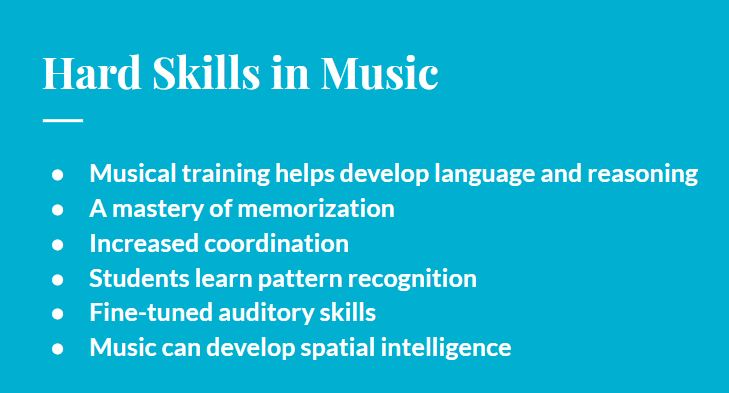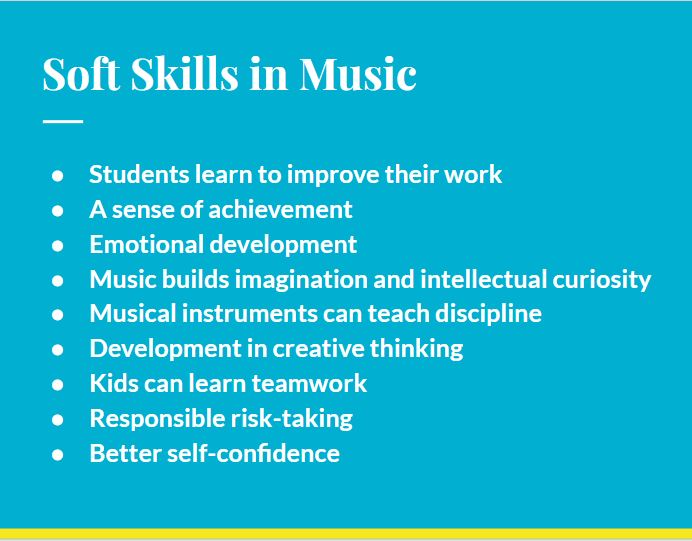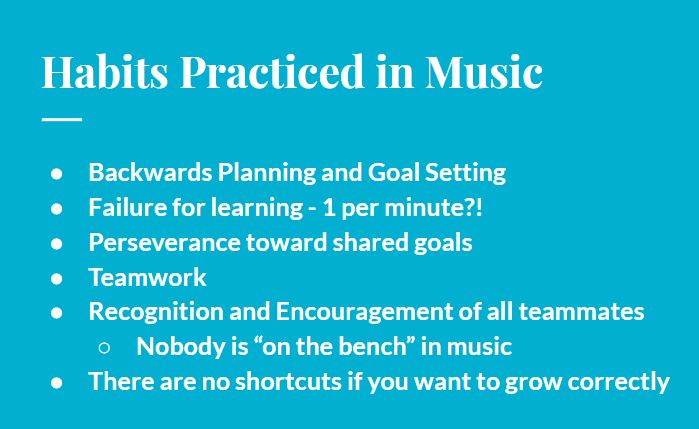Academic and Career Planning (ACP)
The Eau Claire Area School District offers academic and career planning services for all students. The goal is to teach students the necessary Knowledge, Skills, and Habits for life after high school. Some students and families struggle to see the connection that music has with their future. There are many! It is your job as a parent/guardian/student to know how devoted and continued study of music helps prepare for life after high school. Stay involved in band so you can hone the habits, soft skills, and hard skills necessary in your next stage of life. (Yes, even if you're not playing your instrument after you graduate.)
How does Music help me after school?
Music helps to develop hard skills, soft skills, and habits that are beneficial for life after school.
Hard Skills
Hard skills are measurable abilities: Skills like writing, reading, math, singing, and performing on an instrument.
- Musical training helps develop language and reasoning: Students who have early musical training will develop the areas of the brain related to language and reasoning. The left side of the brain is better developed with music, and songs can help imprint information on young minds.
- A mastery of memorization: Even when performing with sheet music, student musicians are constantly using their memory to perform. The skill of memorization can serve students well in education and beyond.
- Increased coordination: Students who practice with musical instruments can improve their hand-eye coordination. Just like playing sports, children can develop motor skills when playing music.
- Students learn pattern recognition: Children can develop their math and pattern-recognition skills with the help of musical education. Playing music offers repetition in a fun format.
- Fine-tuned auditory skills: Musicians can better detect meaningful, information-bearing elements in sounds, like the emotional meaning in a baby’s cry. Students who practice music can have better auditory attention, and pick out predictable patterns from surrounding noise.
- Music can develop spatial intelligence: Students who study music can improve the development of spatial intelligence, which allows them to perceive the world accurately and form mental pictures. Spatial intelligence is helpful for advanced mathematics and more.
Soft Skills
Soft skills are traits that make you a good person, such as etiquette, communication and listening, getting along with others.
- Students learn to improve their work: Learning music promotes craftsmanship, and students learn to want to create good work instead of mediocre work. This desire can be applied to all subjects of study.
- A sense of achievement: Learning to play pieces of music on a new instrument can be a challenging, but achievable goal. Students who master even the smallest goal in music will be able to feel proud of their achievement.
- Emotional development: Students of music can be more emotionally developed, with empathy towards other cultures They also tend to have higher self esteem and are better at coping with anxiety.
- Music builds imagination and intellectual curiosity: Introducing music in the early childhood years can help foster a positive attitude toward learning and curiosity. Artistic education develops the whole brain and develops a child’s imagination.
- Musical instruments can teach discipline: Kids who learn to play an instrument can learn a valuable lesson in discipline. They will have to set time aside to practice and rise to the challenge of learning with discipline to master playing their instrument.
- Development in creative thinking: Kids who study the arts can learn to think creatively. This kind of education can help them solve problems by thinking outside the box and realizing that there may be more than one right answer.
- Kids can learn teamwork: Many musical education programs require teamwork as part of a band or orchestra. In these groups, students will learn how to work together and build camaraderie.
- Responsible risk-taking: Performing a musical piece can bring fear and anxiety. Doing so teaches kids how to take risks and deal with fear, which will help them become successful and reach their potential.
- Better self-confidence: With encouragement from teachers and parents, students playing a musical instrument can build pride and confidence. Musical education is also likely to develop better communication for students.
Habits
Devoted and continued study in music creates habits of successful humans. There are no shortcuts, and the hardest working citizens do hard work because it’s the right thing to do.
- Backwards Planning and Goal Setting: Students have an end goal of a performance and must take steps everyday toward preparing that performance. This is done by setting smaller, more attainable goals that build toward the larger end goal.
- Failure for learning: Failure is a part of growing—without failing often in a safe environment, students take longer to bounce back from failure and are less willing to work through it. Music offers daily opportunities to fail at a rate of 1 failure per minute or more!
- Perseverance toward shared goals: All students are preparing for the same performance and must reflect with each other continuously to make progress.
- Teamwork: All students are depending on all other students success in addition to their own success, because the point of music is performing together. You cannot succeed individually while everyone else is failing. This does not exist in ensembles.
- Recognition and Encouragement of all teammates: Nobody is “on the bench” in music
- There are no shortcuts if you want to grow correctly: You cannot magically “turn it on” for a performance. You have to prepare adequately to have success.



